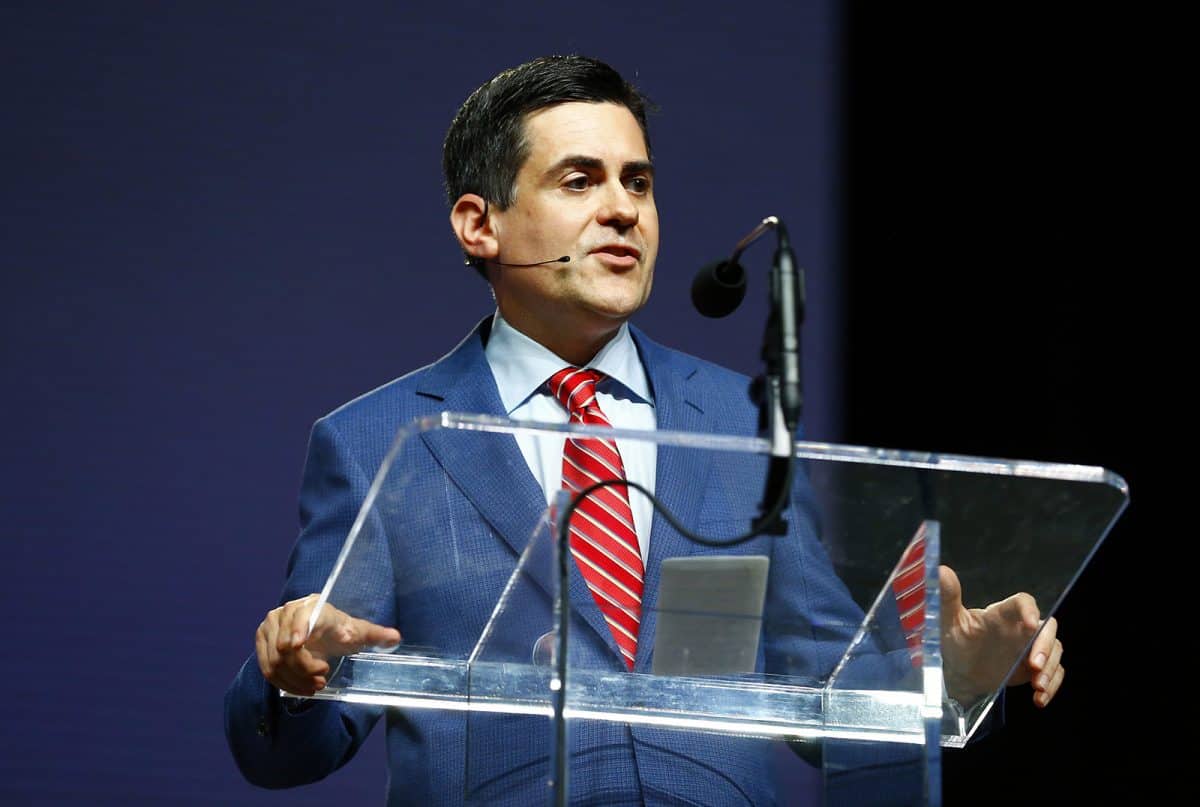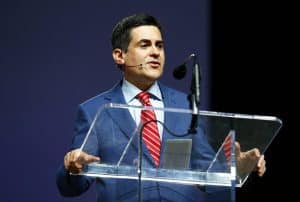
(RNS) — In a long-awaited report released Monday (Feb. 1), a task force commissioned to study the Southern Baptist Convention’s Ethics and Religious Liberty Commission calls the convention’s public policy arm a “significant distraction from the Great Commission work of Southern Baptists.”
Blaming the ERLC for the loss of more than a million dollars in constituent church donations to the denomination, the task force, led by Georgia pastor Mike Stone, quotes the leader of a state Baptist convention as saying, “The ERLC has been a stumbling block not worth the mission dollar investment.”
But there seems to be as much politics as economics in the report’s conclusions. It notes that in recent years, the fear of a “liberal” drift in the denomination has led some churches to leave the SBC or to withhold giving. Part of that dissatisfaction is aimed at the ERLC, and particularly at Russell Moore, who has led the ERLC since 2013.

Russell Moore, president of the Southern Baptist Convention’s Ethics & Religious Liberty Commission speaks during the annual meeting of the Southern Baptist Convention on June 12, 2019 in Birmingham, Alabama. (Butch Dill/Religion News Service).
Though a staunch opponent of abortion and same-sex marriage, two of the issues most important to politically conservative evangelicals, Moore’s views on other issues over the course of the Trump administration — most significantly on immigration, race, and Donald Trump himself — have landed Moore in hot water.
The report does not call for Moore’s ouster, but it does recommend that the ERLC no longer make public comments about any political candidate and only address issues that the SBC has already issued resolutions on.
A spokeswoman for the ERLC told RNS that Moore would not comment on the report, saying that the agency’s board of trustees has instructed him not to speak publicly about it.
But David Prince, chair of the agency’s trustees, said in a statement that “Southern Baptists can see this report for exactly what it is,” and claimed that the ERLC “has served Southern Baptists faithfully during a time of political, cultural, and, in some cases, denominational chaos.”
Prince added, “Much of this chaos remains with us, including widespread news of many of our Black and brown brothers and sisters leaving the SBC. That should be alarming to all of us. Regardless, all this and more is why I am grateful the ERLC serves our churches with a vibrant and bold gospel witness day in and day out.”
The inquiry into the ERLC was set up in February 2020, after members of the SBC’s executive committee raised concerns about giving to the denomination’s cooperative program, which funds statewide and denominational ministries.
The new report claims that hundreds of churches have either left the denomination or withheld funds. It cites one state where $1,147,000 has been “withheld due to the ERLC.” In another state, the report suggests that “$2,448,000” in giving is at risk because of “serious concerns with the ERLC.” Committee members did not identify the states or specific churches.
The report also list a series of direct complaints, among them Moore’s opposition to Trump, claims that the ERLC receives funding linked to progressive philanthropist George Soros, the ERLC’s stance on cooperating with COVID-19 restrictions, and the agency’s support for immigration reforms. More recently, it claims, the ERLC was critical of protesters who stormed the U.S. Capitol but not of Black Lives Matter protests.
The report also cites what it calls “disrespectful and condescending responses” to questions raised by messengers — the SBC’s terms for church delegates to its annual meeting. As one example, the report mentions the response to Arkansas pastor John Wofford at the 2016 meeting. Wofford asked Moore why the ERLC would support the rights of Muslims to build mosques. Moore replied that Baptists had always supported religious liberty and that if a government could ban mosques it could also ban Baptist churches, a response that earned a standing ovation.
Moore is not the first head of the ERLC to be met with disapproval. Two of his predecessors left office because of controversy.
In 2011, longtime ERLC President Richard Land was criticized for his support of a mosque in Murfreesboro, Tennessee, and for joining an interfaith coalition that defended the rights of Muslims to build houses of worship. Criticism from other Southern Baptists eventually forced Land to leave the coalition. Land, a longtime Republican activist, left office after a scandal over plagiarism and comments on race.
Land’s predecessor, N. Larry Baker, lasted just 16 months in the role in the 1980s, where his views on “abortion, capital punishment, and the role of women in the church” were considered controversial, according to Baptist Press. Baker was part of the moderate wing of the SBC that was ousted by a conservative movement in the denomination.
David Gushee, professor of ethics at Mercer University, said that the head of the ERLC has always been in a precarious position. Tasked with bringing Christian ethics to bear on social issues, the ERLC’s president often has to navigate clashes between Christian ethics and popular political positions. That conflict, he said, was one reason for the conservative turn taken by the denomination, known as the Conservative Resurgence or the “Fundamentalist Takeover.”
“Politically conservative Southern Baptists wanted an ethics commission that reflects those values,” he said.
The nature of SBC funding, which asks churches to give voluntarily to national ministries, means that the ERLC president may at times have to criticize views held by people in the pews.
“The trick was always to be the most conservative person in the room,” said Gushee, who did some work for the ERLC in the 1990s before breaking with the SBC.
Nancy Ammerman, a religion sociologist who had studied the SBC culture war of the 1970s and 1980s, noted that Land and Foy Valentine, a longtime head of the Christian Life Commission, as the ERLC was formerly known, were able to connect with large numbers of their fellow Baptists.
“Russell Moore, on the other hand, has been publicly going against the majority of his denomination for the entirety of Trump’s ascendancy,” she told RNS. “He is at odds with them on little else, so if they oust him, it will follow the pattern of Trump loyalty throughout the culture-war movement. Loyalty to Trump, rather than any discernible issue position, would define the denomination’s ‘ethical’ stance.”
The executive committee is expected to discuss the report at its upcoming meeting in Nashville. A prior task force found in 2017 that concerns the ERLC had led to reduced giving were “not as significant in fact as it is in perception,” Baptist Press reported. A 2018 attempt to defund the ERLC failed.






